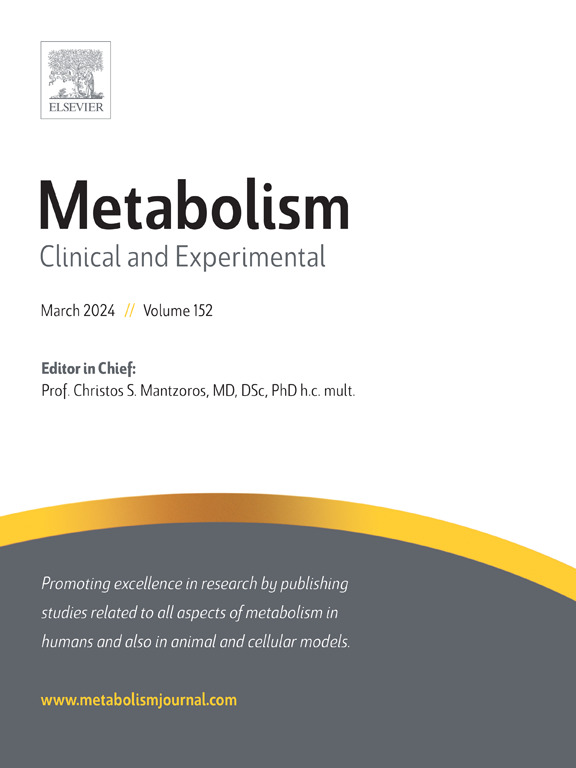Phenome-wide associations of coffee intake in the human phenotype project
IF 11.9
1区 医学
Q1 ENDOCRINOLOGY & METABOLISM
引用次数: 0
Abstract
Objective
Coffee is one of the most widely consumed beverages globally and has been linked to favorable health outcomes. However, its system-wide relationships with human biology and the underlying mechanisms remain poorly characterized. This study aimed to investigate the relationship between coffee consumption and continuous glucose monitoring (CGM) metrics and other biological systems in healthy adults.
Research design and methods
In the Human Phenotype Project, 8666 generally healthy Israeli adults provided two weeks of real-time dietary logs, from which coffee intake was estimated. Participants wore CGM devices throughout this period, and multimodal data spanning 11 additional systems (e.g., gut microbiome, serum lipidomics, and body composition) were collected. We employed machine learning approaches to quantify the extent to which each system reflected coffee intake. We performed linear regression to identify individual traits associated with coffee intake, with false discovery rates < 0.05 considered significant.
Results
This cross-sectional study identified continuously-monitored glucose regulation and gut microbial composition as the most reflective systems of coffee intake, with further analyses revealing favorable glycemic profiles spanning diverse aspects of glucose regulation with increasing coffee intake, and Clostridium phoceensis (i.e., Lawsonibacter asaccharolyticus) as the most significant species positively associated with coffee intake. Additionally, coffee intake was favorably associated with traits across body composition, serum lipidomics, and hepatic, hematopoietic, and renal systems.
Conclusions
This study found that habitual coffee intake was linked to multifaceted favorable glucose control captured by CGM and favorable profiles across multiple biological systems, providing mechanistic insights that may guide precision nutrition strategies for diabetes prevention.
人类表型项目中咖啡摄入的全现象关联。
目的:咖啡是全球消费最广泛的饮料之一,与良好的健康结果有关。然而,其与人类生物学的全系统关系及其潜在机制仍然缺乏特征。本研究旨在探讨健康成年人饮用咖啡与连续血糖监测(CGM)指标和其他生物系统之间的关系。研究设计和方法:在人类表型项目中,8666名一般健康的以色列成年人提供了两周的实时饮食日志,从中估计咖啡摄入量。在此期间,参与者佩戴了CGM装置,并收集了跨越11个额外系统的多模式数据(例如,肠道微生物组、血清脂质组学和身体成分)。我们使用机器学习方法来量化每个系统反映咖啡摄入量的程度。我们进行了线性回归,以确定与咖啡摄入量相关的个体特征,错误发现率 这项横断面研究确定了连续监测的葡萄糖调节和肠道微生物组成是咖啡摄入量最能反映的系统,进一步的分析显示,随着咖啡摄入量的增加,葡萄糖调节的各个方面都出现了有利的血糖分布,而phoce梭菌(即Lawsonibacter asaccharolyticus)是与咖啡摄入量呈正相关的最显著的物种。此外,咖啡摄入量与身体组成、血清脂质组学、肝脏、造血和肾脏系统的特征呈正相关。结论:本研究发现,习惯性咖啡摄入与CGM捕获的多方面有利的葡萄糖控制和多种生物系统的有利特征有关,为糖尿病预防的精确营养策略提供了机制见解。
本文章由计算机程序翻译,如有差异,请以英文原文为准。
求助全文
约1分钟内获得全文
求助全文
来源期刊

Metabolism: clinical and experimental
医学-内分泌学与代谢
CiteScore
18.90
自引率
3.10%
发文量
310
审稿时长
16 days
期刊介绍:
Metabolism upholds research excellence by disseminating high-quality original research, reviews, editorials, and commentaries covering all facets of human metabolism.
Consideration for publication in Metabolism extends to studies in humans, animal, and cellular models, with a particular emphasis on work demonstrating strong translational potential.
The journal addresses a range of topics, including:
- Energy Expenditure and Obesity
- Metabolic Syndrome, Prediabetes, and Diabetes
- Nutrition, Exercise, and the Environment
- Genetics and Genomics, Proteomics, and Metabolomics
- Carbohydrate, Lipid, and Protein Metabolism
- Endocrinology and Hypertension
- Mineral and Bone Metabolism
- Cardiovascular Diseases and Malignancies
- Inflammation in metabolism and immunometabolism
 求助内容:
求助内容: 应助结果提醒方式:
应助结果提醒方式:


